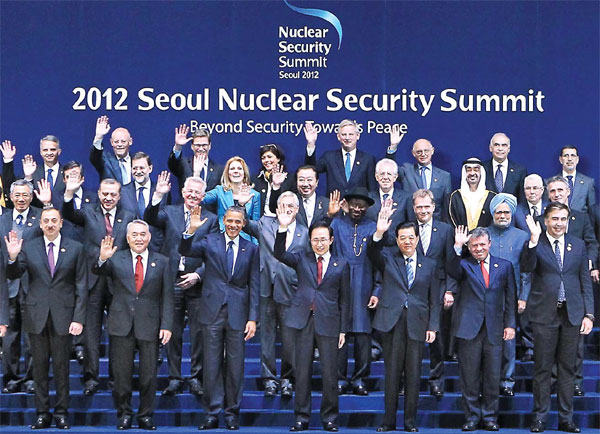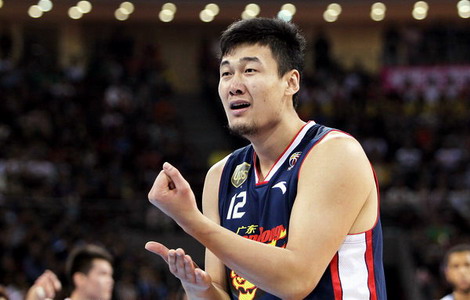 |
|
|
|
|||||||||||
 |
|
President Hu Jintao (front row, third from right) and world leaders pose for a photo at the Seoul Nuclear Security Summit on Tuesday. [Photo/Agencies] |
President tells Seoul summit that greater global cooperation needed
China called for greater nuclear security cooperation on Tuesday and gave its backing to the development of nuclear energy amid global concern following the Fukushima crisis.
By using a "scientific and sensible" approach nuclear security and energy could work in tandem, President Hu Jintao told the Seoul Nuclear Security Summit.
The summit, grouping 53 nations and four international organizations, adopted the Seoul Communique, which called for sustained efforts to "address the issues of nuclear safety and nuclear security in a coherent manner" based on the "substantive progress" made since the inaugural summit in Washington two years ago.
Addressing the summit, Hu urged the international community to "follow a scientific and sensible approach to nuclear security and boost confidence in the development of nuclear energy".
Guaranteeing that nuclear materials and facilities do not fall into the hands of terrorists is a major concern for the international community as is the safety and reliability of reactors following the Fukushima crisis.
A number of countries have abandoned plans to build more reactors.
China prefers nuclear energy to meet its surging demand as the economy undergoes rapid economic expansion.
Yet, Hu also sounded a note of caution. "We should face up to associated risks and make sure that nuclear energy is safer and more reliable."
There has been a major shift in focus since the first nuclear safety summit in 2010. That summit concentrated almost solely on the threat of nuclear terror.
Noting the Fukushima accident of March 2011 and the nexus between nuclear security and safety, the Seoul Communique said that "sustained efforts are required to address the issues of nuclear safety and nuclear security in a coherent manner that will help ensure the safe and secure peaceful uses of nuclear energy".
In the summit speech, Hu urged greater international cooperation to improve nuclear security, saying that China is ready to share its nuclear security measures adopted for large-scale activities, including the 2008 Beijing Olympics or the 2010 Shanghai World Expo, with other countries.
Zhou Qing'an, a professor with Tsinghua University, said Hu's statement showed China's stance on sustainable nuclear energy.
Deng Ge, another Beijing-based expert on nuclear safety, said that Hu's proposals on balancing nuclear security and energy development are feasible and provide a route for a number of countries.
Deng also said that Hu signaled China's willingness and commitment to bolster its global nuclear safety obligations and help others in the field.
Hu also stressed at the summit that China supports the "total ban and thorough destruction of nuclear weapons" and is committed to international nonproliferation efforts. It also supports the right of all countries to develop nuclear energy for peaceful means.
The 13-point communique contains a number of ways in which countries can give more protection to nuclear materials.
Reducing the use of highly enriched uranium is one measure as is the quick and safe removal from facilities of machinery or materials no longer being used.
"Today we have set a new milestone in making the world a safer and more peaceful place," Lee Myung-bak, president of the Republic of Korea, said.
A third summit will be held in the Netherlands in 2014.
According to Assistant Foreign Minister Ma Zhaoxu the summit improved global awareness of nuclear safety issues and offered a platform for participating countries to conduct in-depth exchanges regarding their nuclear experiences.
It was also important to note that voluntary commitments made by countries to strengthen nuclear security served as a supplement to the communique, Ma said.

|

|

|

|

|

|